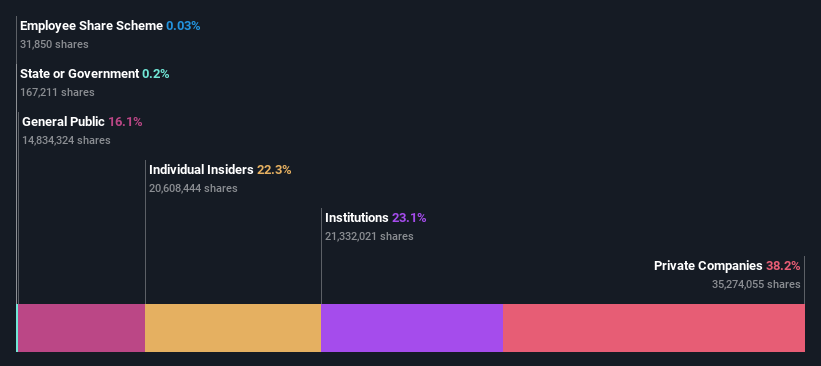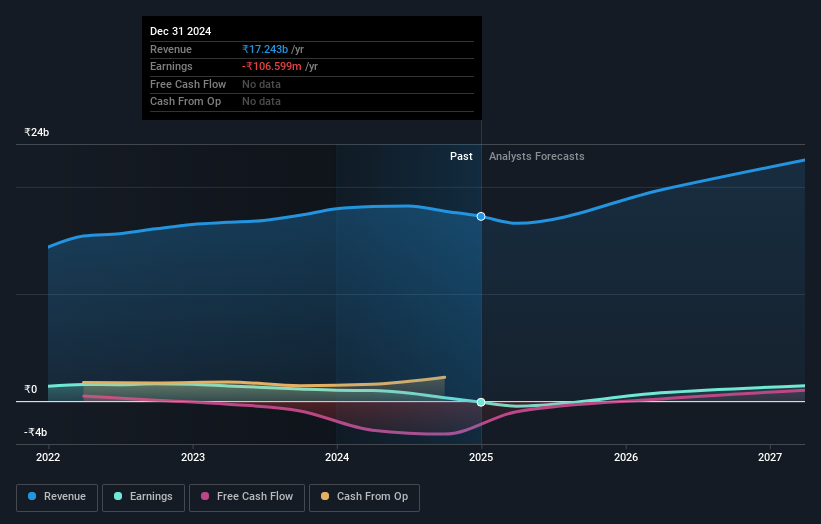Private companies who have a significant stake must be disappointed along with institutions after Indoco Remedies Limited's (NSE:INDOCO) market cap dropped by ₹2.5b
Key Insights
- The considerable ownership by private companies in Indoco Remedies indicates that they collectively have a greater say in management and business strategy
- The top 5 shareholders own 54% of the company
- Insiders have bought recently
If you want to know who really controls Indoco Remedies Limited (NSE:INDOCO), then you'll have to look at the makeup of its share registry. The group holding the most number of shares in the company, around 38% to be precise, is private companies. In other words, the group stands to gain the most (or lose the most) from their investment into the company.
While institutions, who own 23% shares weren’t spared from last week’s ₹2.5b market cap drop, private companies as a group suffered the maximum losses
Let's delve deeper into each type of owner of Indoco Remedies, beginning with the chart below.
Check out our latest analysis for Indoco Remedies

What Does The Institutional Ownership Tell Us About Indoco Remedies?
Institutional investors commonly compare their own returns to the returns of a commonly followed index. So they generally do consider buying larger companies that are included in the relevant benchmark index.
Indoco Remedies already has institutions on the share registry. Indeed, they own a respectable stake in the company. This can indicate that the company has a certain degree of credibility in the investment community. However, it is best to be wary of relying on the supposed validation that comes with institutional investors. They too, get it wrong sometimes. If multiple institutions change their view on a stock at the same time, you could see the share price drop fast. It's therefore worth looking at Indoco Remedies' earnings history below. Of course, the future is what really matters.

Hedge funds don't have many shares in Indoco Remedies. Looking at our data, we can see that the largest shareholder is Spa Holdings Pvt Ltd. with 20% of shares outstanding. For context, the second largest shareholder holds about 17% of the shares outstanding, followed by an ownership of 6.2% by the third-largest shareholder. Aditi Panandikar, who is the third-largest shareholder, also happens to hold the title of Member of the Board of Directors. Additionally, the company's CEO Sundeep Bambolkar directly holds 0.5% of the total shares outstanding.
Our research also brought to light the fact that roughly 54% of the company is controlled by the top 5 shareholders suggesting that these owners wield significant influence on the business.
While it makes sense to study institutional ownership data for a company, it also makes sense to study analyst sentiments to know which way the wind is blowing. Quite a few analysts cover the stock, so you could look into forecast growth quite easily.
Insider Ownership Of Indoco Remedies
The definition of an insider can differ slightly between different countries, but members of the board of directors always count. Management ultimately answers to the board. However, it is not uncommon for managers to be executive board members, especially if they are a founder or the CEO.
Most consider insider ownership a positive because it can indicate the board is well aligned with other shareholders. However, on some occasions too much power is concentrated within this group.
It seems insiders own a significant proportion of Indoco Remedies Limited. Insiders own ₹4.6b worth of shares in the ₹21b company. We would say this shows alignment with shareholders, but it is worth noting that the company is still quite small; some insiders may have founded the business. You can click here to see if those insiders have been buying or selling.
General Public Ownership
The general public-- including retail investors -- own 16% stake in the company, and hence can't easily be ignored. While this group can't necessarily call the shots, it can certainly have a real influence on how the company is run.
Private Company Ownership
It seems that Private Companies own 38%, of the Indoco Remedies stock. It's hard to draw any conclusions from this fact alone, so its worth looking into who owns those private companies. Sometimes insiders or other related parties have an interest in shares in a public company through a separate private company.
Next Steps:
I find it very interesting to look at who exactly owns a company. But to truly gain insight, we need to consider other information, too. Consider for instance, the ever-present spectre of investment risk. We've identified 2 warning signs with Indoco Remedies (at least 1 which is potentially serious) , and understanding them should be part of your investment process.
If you are like me, you may want to think about whether this company will grow or shrink. Luckily, you can check this free report showing analyst forecasts for its future.
NB: Figures in this article are calculated using data from the last twelve months, which refer to the 12-month period ending on the last date of the month the financial statement is dated. This may not be consistent with full year annual report figures.
New: AI Stock Screener & Alerts
Our new AI Stock Screener scans the market every day to uncover opportunities.
• Dividend Powerhouses (3%+ Yield)
• Undervalued Small Caps with Insider Buying
• High growth Tech and AI Companies
Or build your own from over 50 metrics.
Have feedback on this article? Concerned about the content? Get in touch with us directly. Alternatively, email editorial-team (at) simplywallst.com.
This article by Simply Wall St is general in nature. We provide commentary based on historical data and analyst forecasts only using an unbiased methodology and our articles are not intended to be financial advice. It does not constitute a recommendation to buy or sell any stock, and does not take account of your objectives, or your financial situation. We aim to bring you long-term focused analysis driven by fundamental data. Note that our analysis may not factor in the latest price-sensitive company announcements or qualitative material. Simply Wall St has no position in any stocks mentioned.
About NSEI:INDOCO
Indoco Remedies
Manufactures and markets formulations and active pharmaceutical ingredients in India and internationally.
Undervalued with reasonable growth potential.
Similar Companies
Market Insights
Community Narratives



